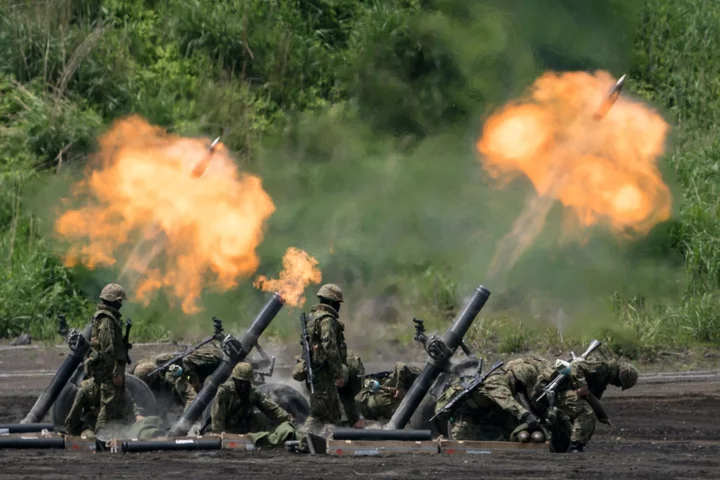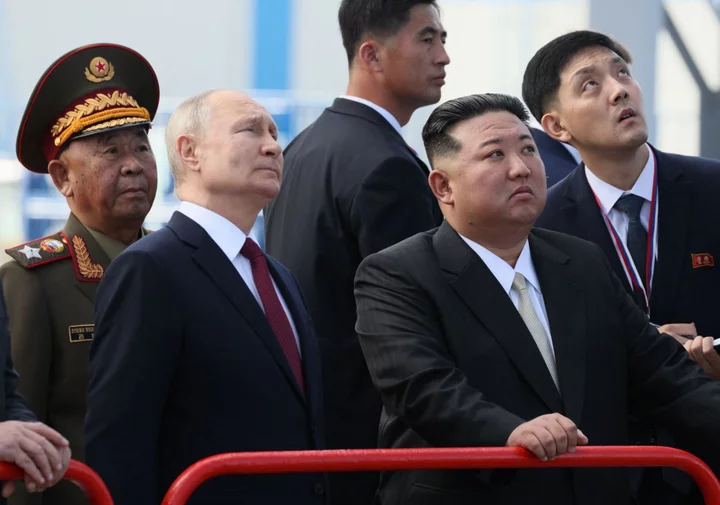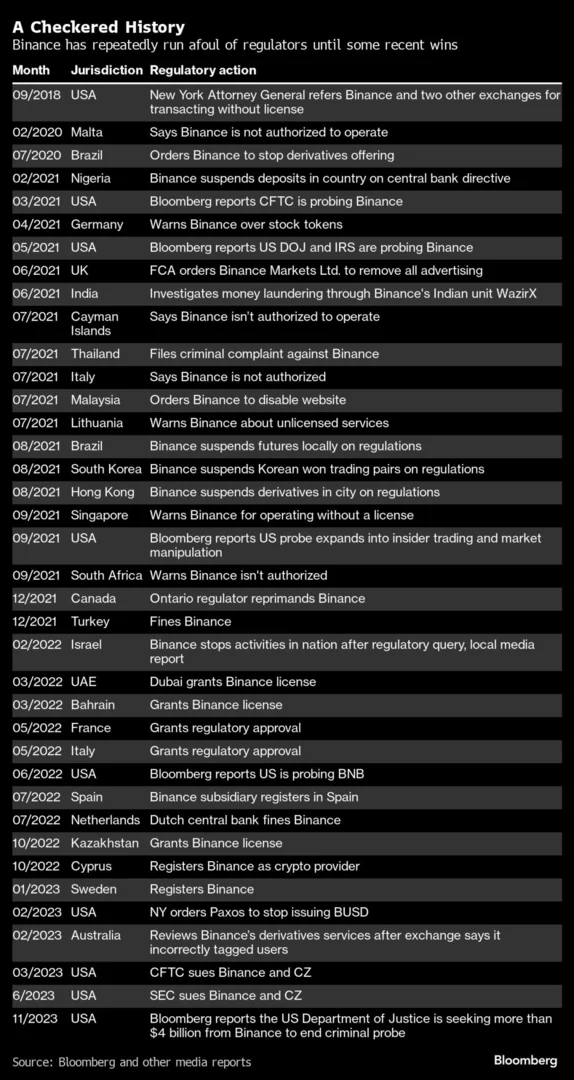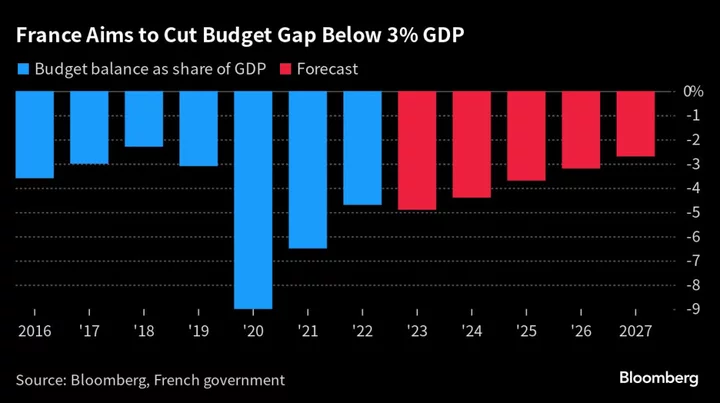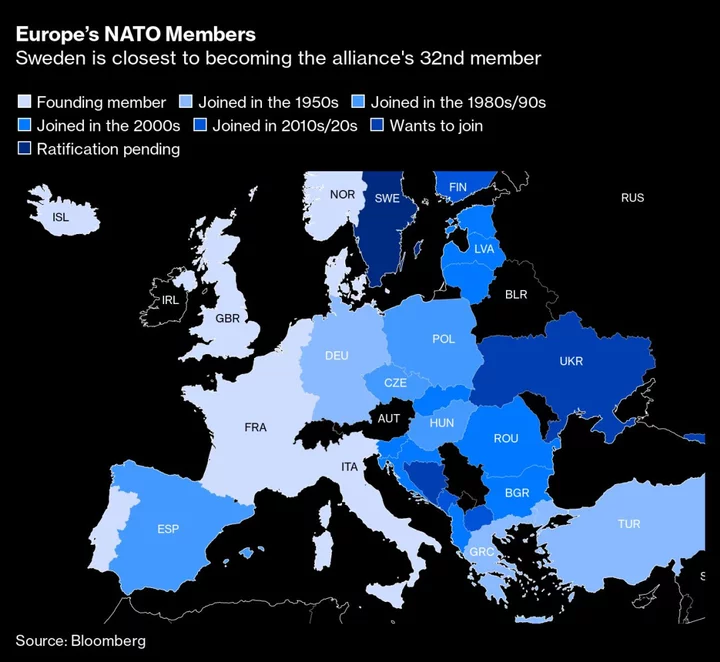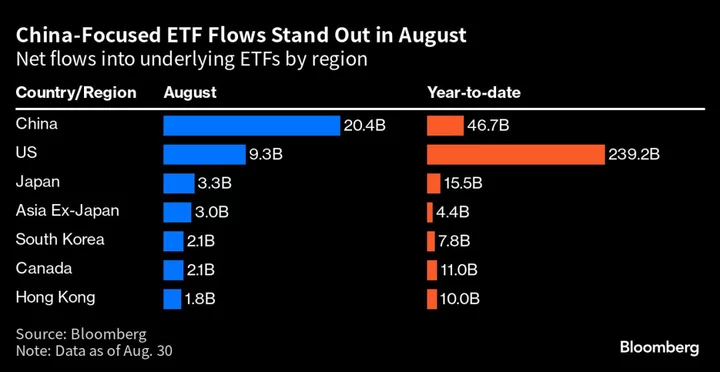Japanese lawmakers are weighing sales of government stakes in some of the nation’s biggest companies to fund expanding defense costs. But doing so won’t be easy, given the need to reach a consensus within the government, and a requirement to change laws in some cases.
While factors including higher-than-expected tax incomes have left Japan with a higher budget surplus that could be used for defense spending, the government has admitted tax hikes can’t be avoided in the long run.
Yet Prime Minister Fumio Kishida’s administration has already pushed back a decision on when to raise taxes to cover defense costs. As support for Kishida remains around its lowest since he took office, the premier is likely seeking temporary ways to stave off talks of a levy increase.
So far Kishida has already pledged to double Japan’s defense spending to 2% of gross domestic product by fiscal year 2027, aiming for 43 trillion yen ($301 billion) of outlays over the next five years. Kishida has also promised to boost spending to tackle the nation’s birthrate crisis.
As of the end of March 2022, around 90% of the 32.8 trillion yen of government stock holdings couldn’t be sold, due to a variety of laws and regulations. Still, the ruling party is set to begin discussing the possibility of selling Nippon Telegraph and Telephone Corporation shares to fund defense. The government is also pushing forward with plans to sell shares in subway operator Tokyo Metro Co. and Shoko Chukin Bank, although those proceeds may not necessarily be used for defense.
Here is a list of the major shares owned by the government, and where Japan stands on them as it mulls more spending on defense and efforts to turn around its shrinking population.
NTT
- Value of holding (market value): around 4.7 trillion yen
- % stake: 33.3% (excluding impact of NTT capital raise)
- Requirements: at least one-third of shares need to be held by government
Selling government-held NTT shares has been recently discussed as one option for financing defense. Koichi Hagiuda, the policy chief of the ruling Liberal Democratic Party, said last month that the party will start discussing the possibility of selling NTT shares, according to Kyodo news. A panel headed by Hagiuda was charged with launching the discussion as soon as August, the report said.
If the law binding Japan to its NTT holdings is revised and the government is freed from its obligations, it would have access to nearly 5 trillion yen of funds, which could contribute to the additional defense spending planned over the next 5 years.
At the same time, Finance Minister Shunichi Suzuki has warned that selling the shares will result in a loss of dividend earnings, which are expected to be worth around 150 billion yen this fiscal year.
Tokyo Metro
- Value of holding (book value): 310 billion yen
- % stake: 53.4%
- Requirements: -
Talks are underway to sell the government’s holdings in the operator of the capital’s vast underground train network, although the proceeds wouldn’t necessarily be used to fund additional defense spending — some have already been earmarked for the restoration of earthquake hit regions in Japan.
The Finance Ministry holds a little over half of Tokyo Metro’s outstanding shares, with the remainder held by the Tokyo Metropolitan Government.
About two years ago, the national government and the capital agreed to sell a part of their respective holdings in the subway operator, making way for the company to list its shares. The two shareholders have already chosen five underwriters, including Nomura Securities Co. and Goldman Sachs, while keeping the timing still undetermined.
Shoko Chukin Bank
- Value of holding (book value): 209 billion yen
- % stake: 46.5%
- Requirements: -
In June, a revised Shoko Chukin Bank law was passed to privatize the government-affiliated loan bank specializing in small and medium-sized businesses, for the sake of flexibility in management. The government will sell all of its 46% stake within two years and remove restrictions on investment in companies.
Still, the possibility is high that the proceeds will largely be used to support small and medium firms, rather than used in other government policy objectives.
Japan Tobacco
- Value of holding (market value): around 2.1 trillion yen
- % stake: 33.4%
- Requirements: more than one-third of shares need to be held by government
The tobacco company’s shares have also been debated as a possible candidate for raising funds. In 2011, after the Great East Japan Earthquake, the government amended laws regarding JT holdings, cutting the required holding ratio from one-half to one-third of outstanding shares. As a result, the government obtained about 973.4 billion yen by selling the extra portion, and repaid the bonds issued to fund restoration efforts after the disaster.
Former Prime Minister Shinzo Abe said back in 2014 that the government should consider selling its remaining stake in JT, leading to a full privatization for the tobacco company which sells Winston and Camel cigarettes outside the US.
Japan Post Holdings
- Value of holding (market value): 1.3 trillion yen
- % stake: 34.3%
- Requirements: more than one-third of shares need to be held by government
The subject of major political wrangling in the late 1990s and 2000s, the majority private Japan Post Holdings Co. is another company where the government still remains the largest shareholder. The Finance Ministry owns more than a third of Japan Post’s outstanding shares, and has to keep holding a third under a law that preserves the government’s right to participate in the postal-services operator’s management.
Other Holdings
The government maintains shares in a broad range of other firms, from airport operators to lenders, but in many cases is required to hold on to all of the shares. For holdings where there aren’t any clear obligations, there’s still little talk of them being sold.
--With assistance from Emi Urabe.

